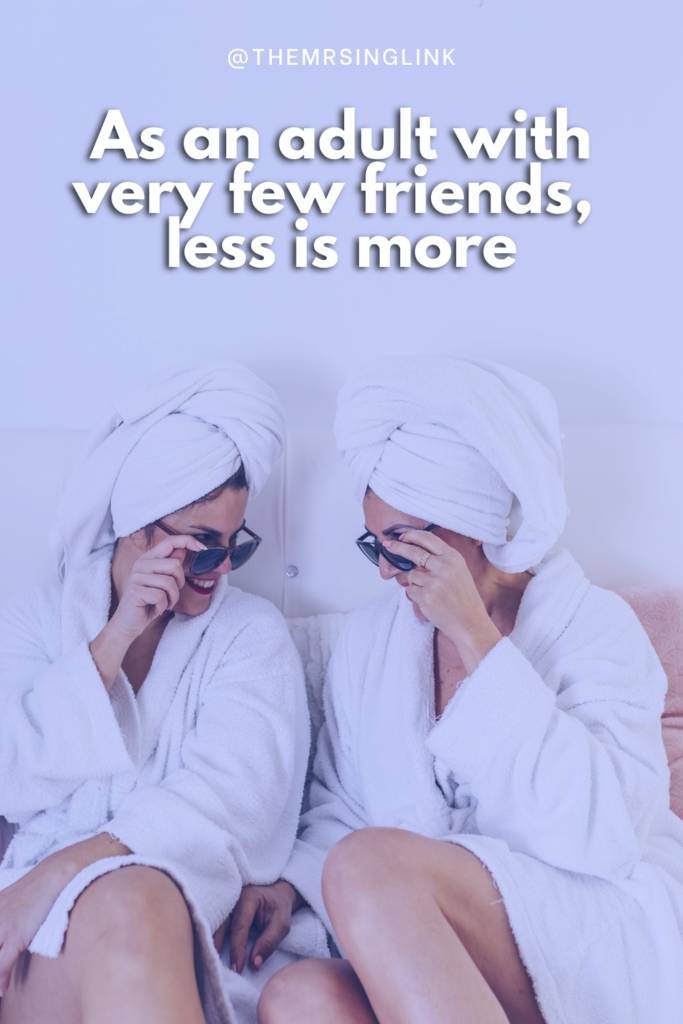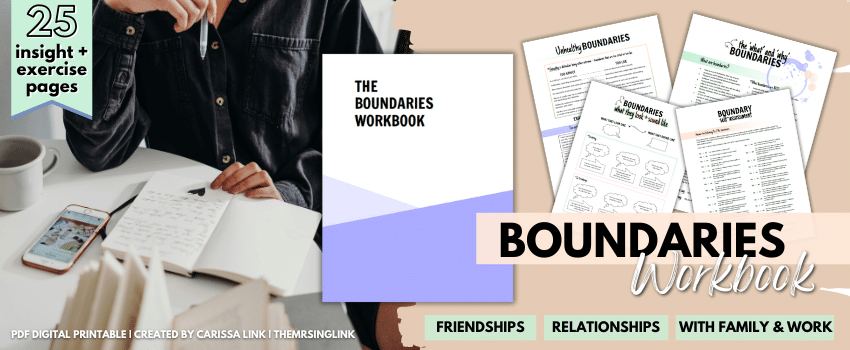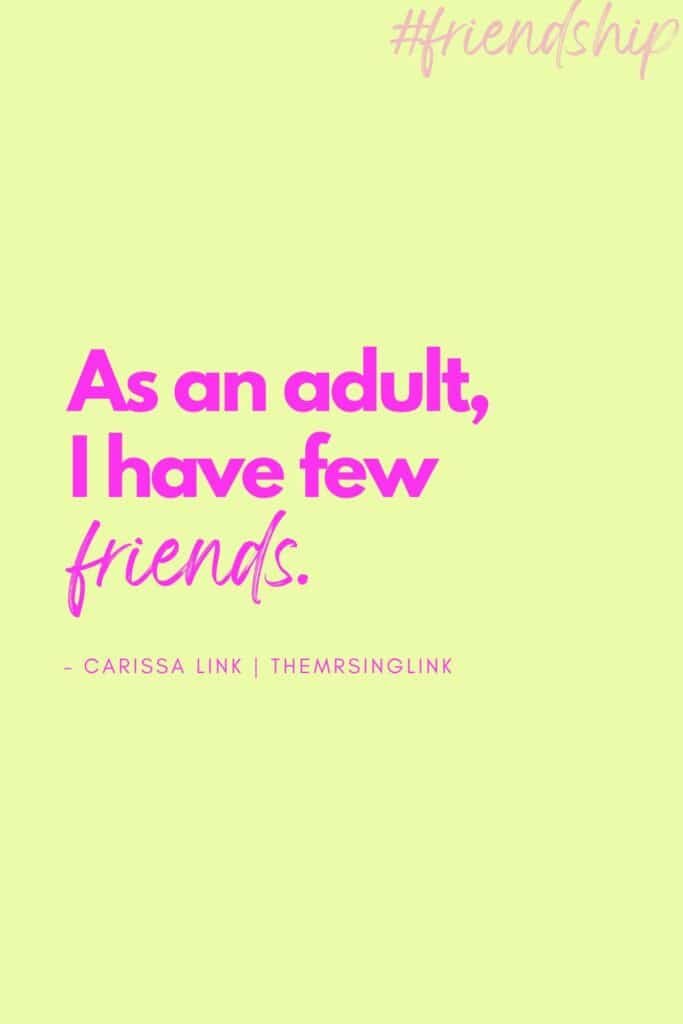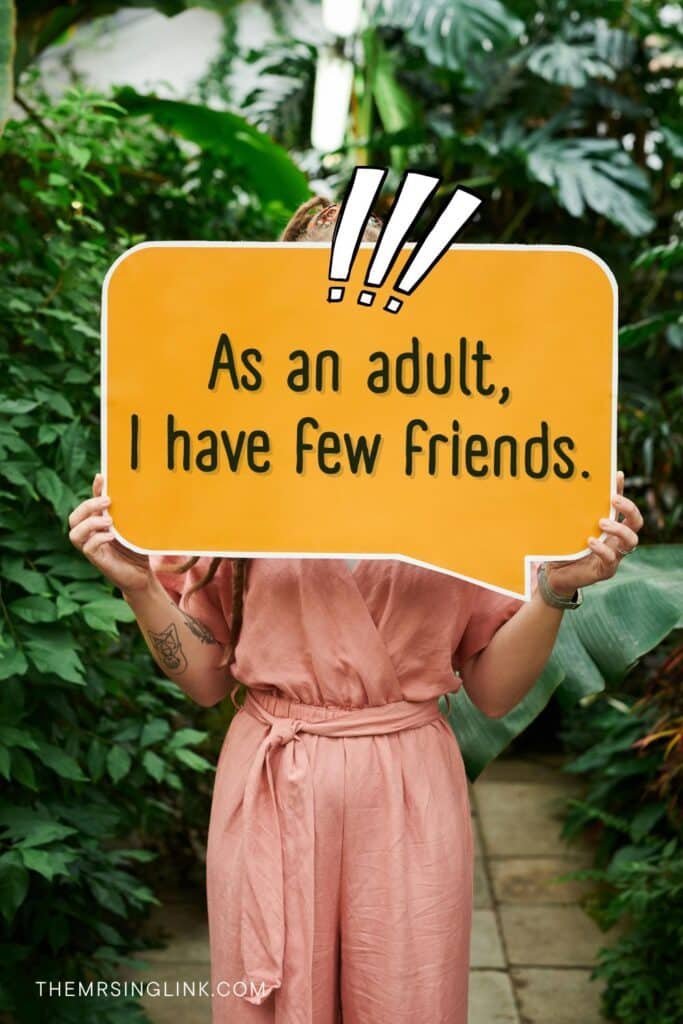I’m a 30-something year old adult now, and I have few friends. If I’ve learned anything at this point is that less is more, and I’ve never been happier. Allow me to explain in simpler terms: quality over quantity.
There was certainly a time in my life when I viewed having friends as a social lifeline and status symbol – the same way many view relationships. This landed me in a place surrounded by those I wasn’t proud to call my “Friends”. This contributed to losing sight of myself, who I was (am) and my overall happiness. I experienced this sense of over-stimulation (and burn out) by what I thought was “life success” in terms of friendship and a bustling social life.
Then one day I blinked and realized how often I was basically drowning in sorrow – believing I had no one, or at least no one I felt was a genuine friend in my life. I even experienced this while seeming having *many* friends.
Consequently, I ended up removing a lot of people in my life – er, more like removing myself from them. And when positive results didn’t follow, I slunk deeper into the constant draining and agony of my conditioned beliefs on friendship.
I had the constant streamline of questions – “What’s wrong with me? What’s wrong with them?” It lead me to question everything I knew, and through that, I embarked on a lesson that truly opened my eyes to the meaning of adult friendship for the first time.

As an adult I have few friends (what I’m learning)
Friends are no longer a necessity or an accessory
No, I am not trying to say that people are invaluable and dispensable, though I do feel we view friendships as being a necessity while treating them like an accessory.
I don’t mean to sound brash, but handbags are an accessory. Water is a necessity – meaning you are entitled access to it to survive, plain and simple.
Yet I was there once, in high school, where it was “cool” to have lots and lots of friends or at least to be liked by many. It was common to have several groups of friends. I don’t think it even mattered if you had a bad rep or people talked bad about you, for as long as you were known and remembered, there were bound to be those who find you of some “value”.
Fitting in, feeling a part of something, being included, and being accepted – oh, the significance. Alas, you didn’t make it through grade school without having a safety net of “friends”. And by making it I mean survive [emotionally and socially] on all fronts.
Honestly, I look back on much of my friendships in and throughout high school and most of them were, I hate to even admit this, collateral for that survival. Actually, scratch that, the default collateral was myself – the real, unapologetic me. That’s who was often sacrificed, left at home, and locked behind closed doors in order to survive – to make friends, to be accepted, and to feel “included”.
These friends were not and were never going to be the embodiment of true friendship – whether or not I actually knew that. But that doesn’t mean I didn’t have friends I genuinely cared about or liked. I was rather heartbroken by friendships that, in the end, ceased once grade school was over.
At that time, though, I really didn’t know what it meant to have real friends – how could I? So I carried this over to college, in the workplace, and into my adult life. I think many of us do based on our individual experience.
It took me a long time to learn, and accept, that friendship – real, genuine, friendship – is a privilege, not a necessity. And, sadly, high school has proven that for me. The main difference? Well, you treat them differently. When a friendship is a necessity, you either resort to abandoning yourself (your needs, boundaries, who you are) or using others (to “find” yourself, to meet your needs, to your own advantage)…without even knowing or realizing it. And, yes, we all use others, so there’s no room for denial there.
But when a friendship is a privilege, there’s no sense of entitlement. It becomes less “I deserve this” and more “I want this, so I value it“. And when I value something its for reasons other than for myself. Unfortunately I find that many adult friendships are for selfish reasons.
You’ve probably heard the phrase, “Friendships are like seasons – some come and go for a reason, maybe only for a season, some hibernate for the winter, and some weather out the storms with you.” And we’re encouraged to see and learn the value in those that stay because those are the ones who are with you in your individual seasons of change. And that’s an absolute privilege, which brings me to my next point…
[pt_view id=”aafdd82yx5″]
Friendship “seasons” are normal
What is a “season” exactly? Think about it. We all go through stuff in our lives – things change, we change, and adapt. We’re not always going to be on the same plane or wavelength as others all throughout life, especially with friends.
For instance, you are now married while your friend is still single. Your priorities and commitments involve more than yourself, while your single friend continues spending their time the way they do. This doesn’t doom a friendship – at least it shouldn’t – but it does and can change.
Whether seasons are adaptable is the bigger question, and not every season will be to each individual’s liking. That’s okay, too. Again, say you move out of state for a job, leaving your friendship limited to texts and phone calls. This either strengthens the friendship on a different level or it doesn’t. Say, in the end, you move back – if the friendship survives you will pick up right where you left off.
We forget that many friendships often drift due to the simple fact of seasons. Instead, we resort to labeling the “falling out” of friendships too leniently and loosely. It can be a tough pill to swallow that friends may not (and aren’t expected to) bend and conform to every adaptation or change in our lives.
So when two friends with very different lives are met with new changes, hardship, and less than ideal shifts…this can create a new narrative for each side and often lead to “drifts” or falling out over time. Here are some pretty common examples:
“My friend had a baby,”…which means less time together (or doing more things that accommodate their motherhood).
“We no longer work together,”…which means having nothing in common (since work is how we primarily connected).
“They are too busy since their new job and getting married,”…which means I’m not first on the totem pole of their free time.
“Losing a family member has been hard on them,”…which means dealing with possible lulls or periods of one-sided effort.
“Money problems is a frequent occurrence for them,”…which means I’m left feeling guilty of picking up the slack or always meeting them where they’re at.
“We went to different schools out of state,”…which means they made new friends where they’re at (as did I), and eventually we put each other on the back burner.
“They’re often facing hardships,”…which means I don’t have the capacity for all their problems plus my own.
“They got a new boyfriend,”…which means they’ll only want me when they need me.
“They started a new diet fad,”…which means that’s too inconvenient because it goes against my lifestyle.
“They found religion/became religious,”…which means how they now live their life contradicts mine, which makes me feel judged.
“They switched/have opposing political views,”…which means they’re not who I thought they were and are against me morally/fundamentally.
Blah, blah, blah, then ending with, “…it changed them. It changed us. We’re not the same friends anymore.” And maybe so, but listen, I don’t think we really take the time to sit with our presumptions and ask ourselves, “Does this REALLY mean we’re not friends, or is the circumstance triggering something [in me] that I need to reflect on, acknowledge or address?” Either way, it’s plainly unrealistic to expect a friendship to remain a constant or unchanged for as long as you experience your own seasons [changes] in life.
Remember when I said in the beginning that I believe less is more? So in this case, how is less more? Expect less, accept more. *No, that doesn’t mean you have to support or agree with everything.
I can focus on getting to know them as a person
You know, for more than the aspects I like, their qualities that benefit me, but for the actual person. The person beyond a definition (of a friend). Because having a friend is more than a good time and filling our social tank, I hope.
Sure, we all want that friend who is likable, agreeable, tolerable (good vibes, easy-going, “no worries” type), accepting, understanding, caring, giving, timely, respectful, well-mannered, and the like. Of course we do, but are we, ourselves, always that way? Um, no. I know for a fact I am not always agreeable, tolerable, timely, or as accepting and caring as I COULD and SHOULD be.
I also know what it’s like to fake it til you make it, “go along to get along“, or to hide how I really feel and what I really think in order to keep the peace. And when I am that person, friends don’t get to know the real me at all, which wasn’t always going to be this perfect [ideal] vision of a friend, or person, in their eyes.
It’s only in my adulthood, after having lost and let go of adolescent friendships, that I learned a genuine connection is only capable and sustainable for as long as both individuals are willing to face the counterparts that are hard, difficult, and uncomfortable. *Truthfully, the aspects that have nothing to do with or serve friendship at all.
Now I didn’t necessarily say we are to tolerate maltreatment or to support involuntarily, but to acknowledge, seek to understand and Love them outside the parameters of self-serving means. So it really is a matter of getting to know someone not for what they “bring to the table” in friendship, but valuing them as their own individual, including the parts that aren’t as desirable. You know, the parts that make us human?
That being said, I do think we have the strongest difficulty facing, let alone truly accepting [incompatible] differences in others – period. Moreover, we crumble when we’re not treated how we expect (er, “how we apparently treat them”), or when mistakes are made. We take these so personally, like as an attack on our own character or even threat to our livelihood. It’s as if we forget that we’re not looking at a mirror image of ourselves in a friend.

Into entering my adult years, after friendships ended, the number of friends I actually only knew on the surface smacked me straight in the face. Mainly because the surface is just so sweet, soft, complacent, safe, and comfortable – going beyond the surface meant I would have to face uncertainty, hard truths, scrutiny, opposition, insecurity, disappointment, and the likelihood of my fragile, wounded ego.
You could say friendships ended simply because of what I learned about them on or beyond the surface, while others had such tough, impenetrable exteriors. Sometimes I feel the easiest answer is that we just expect more of others than we are willing to accept about them. Meaning, there are those who genuinely believe friendships ought to stay surface level while others heavily base their friendships on what’s beneath the surface. And for many, that is a harsh reality too much to bear, including myself.
So in the case of less is more, how so? Well, as an adult with fewer friends, I’ve spent more time getting to know who I am – learning to juggle self-acceptance, compassion, and forgiveness, and that others deserve similar grace. Though this whole “me, me, me” journey our culture has nurtured really has nothing to do with serving others, it is certainly not the be-all-end-all.
Unfortunately, we are partaking in this so-called movement that is all about “empathy, love, and light” that actually pushes “me, me, me“, and it’s taking us down a very broad, self-absorbing path. And in friendship, there’s too much focus on the self, and less on others, which means we’re less accepting, empathetic and truly Loving (that isn’t the *man-made*, subjective definition of Love).
At the very least, I can [hopefully] offer what I gained and learned to others (my friends). And by getting to know each of them more deeply and uniquely, on a level beyond the surface, I can see them as a person (for who they are outside of friendship) rather than leaning on what they can provide [for me] or who I want [hope] them to be.

